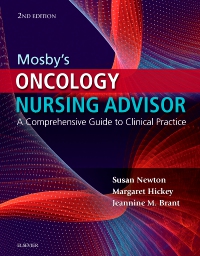
Mosby's Oncology Nursing Advisor - Elsevier eBook on VitalSource, 2nd Edition
Elsevier eBook on VitalSource

Give your students quick access to the most essential oncology nursing content with Mosby’s Oncology Nursing Advisor, 2nd Edition. Covering everything from the various types of cancer and cancer treatment options to patient teaching and nursing best practices, this indispensable nursing guide is like getting seven books in one! Plus, its user-friendly layout and straightforward coverage make it ideal for students to use as a reference in any clinical setting where patients with cancer receive care. With 17 new chapters, updated evidence-based content throughout, proven patient teaching handouts, and more, this new edition offers the authoritative guidance your students need to provide the best possible oncology nursing care.
Newer Edition Available
Mosby's Oncology Nursing Advisor - Elsevier E-Book on VitalSource
-
- Detailed descriptions of more than 50 major cancer types provide essential information on incidence, etiology and risk factors, signs and symptoms, diagnostic workup, histology, staging, treatment, prognosis, and prevention
- Coverage of cancer management principles outlines a wide range of treatment and pharmacologic modalities, including surgery, chemotherapy, radiation therapy, hormonal therapy, immunotherapy, and complementary and alternative therapies
- Symptom management guidelines provide in-depth coverage of pathophysiology, signs and symptoms, assessment tools, lab and diagnostic tests, differential diagnoses, interventions, patient education, follow-up care, and resources for more than 30 common symptoms associated with cancer and cancer treatments
- NEW! 17 new chapters cover topics including myelofibrosis, neuroendocrine cancers, tumor treating fields, oral adherence, clinical trials, epistaxis, hypersensitivity reactions, hypertension, hyperglycemia, nail changes, ocular and visual changes, rashes, survivorship, quality and safety, evidence-based practice, nurse navigation, and patient education
- NEW! Nursing Practice Considerations section incorporates information on communication, cultural considerations, ethical considerations, safe and quality care, evidence-based practice, patient navigation, and patient education
- NEW! Updated evidence-based content reflects the latest national and international quality standards for various cancer types, major drug and non-drug treatments, treatment protocols, and approaches to symptom management
- NEW! Expanded content on patient education including high-quality electronic patient teaching handouts helps students provide expert patient teaching
- Essential information on many oncologic emergencies and emergent issues prepares students to respond quickly to structural, metabolic, and hematologic emergencies
- Section on palliative care and end-of-life issues offers helpful guidelines for dealing with topics related to survivorship, palliative care, the final hours of the cancer patient, and loss, grief, and bereavement
-
- NEW! Updated evidence-based content reflects the latest national and international quality standards regarding various cancer types, major drug and non-drug treatments, treatment protocols, and approaches to symptom management
- NEW! Nursing Practice Considerations section incorporates information on communication, cultural considerations, ethical considerations, safe and quality care, evidence-based practice, patient navigation, and patient education
- NEW! 17 new chapters cover topics including myelofibrosis, neuroendocrine cancers, tumor treating fields, oral adherence, clinical trials, epistaxis, hypersensitivity reactions, hypertension, hyperglycemia, nail changes, ocular and visual changes, rashes, survivorship, quality and safety, evidence-based practice, nurse navigation, and patient education
- NEW! Expanded content on patient education keeps readers on top of best practices in this critical area
- NEW! High-quality electronic patient teaching handouts are evidence-based and have been vetted by practicing nurses
-
Section One: INTRODUCTION
Cancer Epidemiology
Cancer Pathophysiology
Cancer Genetics
Section Two: MAJOR CANCERS
Breast Cancer
Central Nervous System Cancers
Gastrointestinal System Cancers
Genitourinary Cancers
Gynecologic Cancers
Head and Neck Cancers
Leukemias
Lymphomas
Lung Cancers
Multiple Myeloma
Myelofibrosis NEW!
Neuroendocrine Cancers NEW!
Sarcomas
Skin Cancers
Section Three: PRINCIPLES OF CANCER MANAGEMENT
Surgical Therapy
Radiation Therapy
Tumor Treating Fields NEW!
Hematopoietic Stem Cell Transplantation
Chemotherapy
Immunotherapy
Targeted Therapy
Hormonal Therapy
Oral Adherence NEW!
Complementary and Alternative Therapies
Clinical Trials NEW!
Section Four: PRINCIPLES OF SYMPTOM MANAGEMENT
Alopecia
Anorexia
Anxiety
Arthralgias and Myalgias
Confusion
Constipation
Cough
Depressed Mood
Diarrhea
Dizziness and Vertigo
Dysphagia
Dyspnea
Epistaxis NEW!
Esophagitis
Fatigue
Fever
Flu-like Symptoms
Hand-Foot Syndrome
Headache
Hiccups
Hypersensitivity Reactions NEW!
Hypertension NEW!
Hyperglycemia NEW!
Lymphedema
Menopausal Symptoms
Mucositis
Nail Changes NEW!
Nausea and Vomiting
Ocular/Visual Changes NEW!
Pain
Peripheral Neuropathy
Pleural Effusion
Pruritus/Xerosis
Rash NEW!
Seizures
Sexuality Alterations
Sleep Disturbances
Xerostomia
Section Five: ONCOLOGIC EMERGENCIES
Structural Emergencies
Urologic Emergencies
Metabolic Emergencies
Hematologic Emergencies
Section Six: PALLIATIVE CARE AND END-OF-LIFE ISSUES
Survivorship NEW!
Palliative Care
Final Hours
Loss, Grief, and Bereavement
Section Seven. NURSING PRACTICE CONSIDERATIONS NEW!
Communication
Cultural Considerations
Ethical Considerations
Quality and Safety NEW!
Evidence-Based Practice NEW!
Patient Navigation NEW!
Patient Education NEW!


 as described in our
as described in our 